HNN301 Assessment: Nursing Mental Health and Workplace Factors
VerifiedAdded on 2022/10/10
|8
|2316
|205
Essay
AI Summary
This assignment critically examines the impact of workplace bullying and extended shift timings on the mental health of nursing professionals. It explores how these factors contribute to increased stress, anxiety, and depression, ultimately affecting the quality of care provided. The paper highlights the negative consequences of bullying, including decreased self-esteem and job satisfaction, and the disruption of circadian rhythms caused by shift work, leading to burnout and compassion fatigue. Furthermore, it identifies and explains the importance of building resilience in nurses, particularly through awareness-based communication training programs. This training aims to improve communication skills, foster supportive relationships, and provide coping mechanisms to mitigate the adverse effects of workplace stressors. The paper concludes that by addressing these issues and promoting resilience, healthcare organizations can improve the mental well-being of nurses and, consequently, enhance patient care.
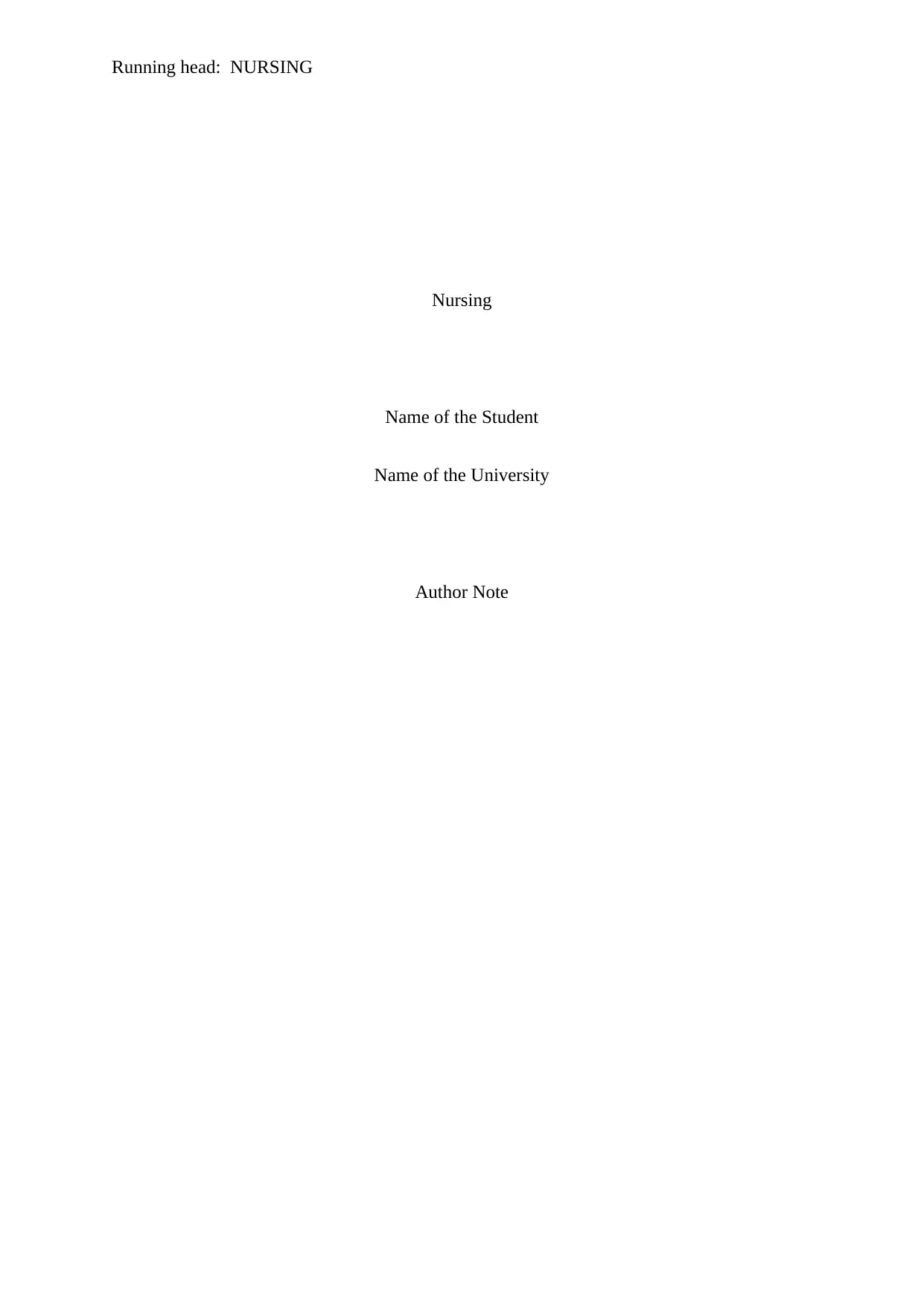
Running head: NURSING
Nursing
Name of the Student
Name of the University
Author Note
Nursing
Name of the Student
Name of the University
Author Note
Paraphrase This Document
Need a fresh take? Get an instant paraphrase of this document with our AI Paraphraser
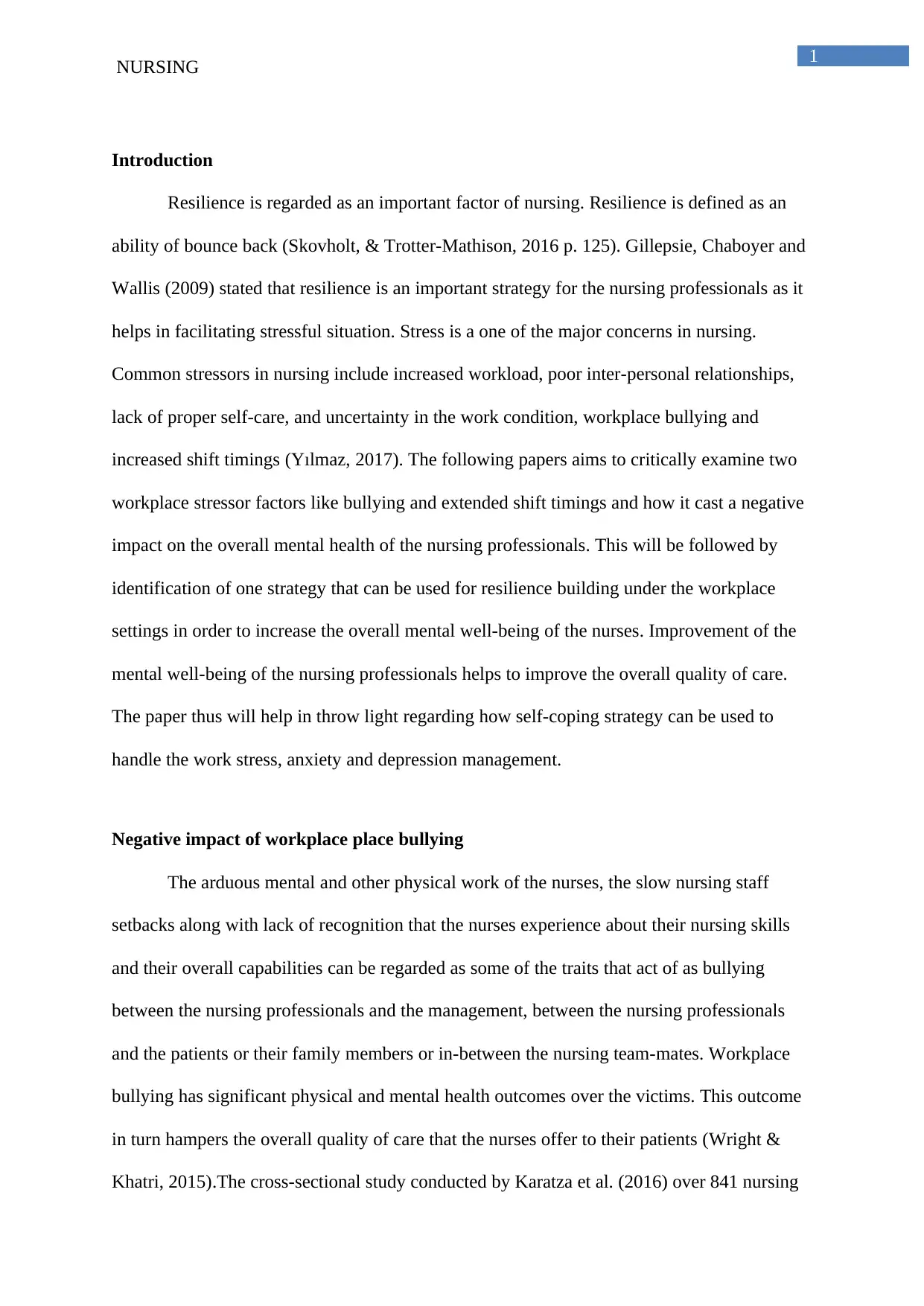
1
NURSING
Introduction
Resilience is regarded as an important factor of nursing. Resilience is defined as an
ability of bounce back (Skovholt, & Trotter-Mathison, 2016 p. 125). Gillepsie, Chaboyer and
Wallis (2009) stated that resilience is an important strategy for the nursing professionals as it
helps in facilitating stressful situation. Stress is a one of the major concerns in nursing.
Common stressors in nursing include increased workload, poor inter-personal relationships,
lack of proper self-care, and uncertainty in the work condition, workplace bullying and
increased shift timings (Yılmaz, 2017). The following papers aims to critically examine two
workplace stressor factors like bullying and extended shift timings and how it cast a negative
impact on the overall mental health of the nursing professionals. This will be followed by
identification of one strategy that can be used for resilience building under the workplace
settings in order to increase the overall mental well-being of the nurses. Improvement of the
mental well-being of the nursing professionals helps to improve the overall quality of care.
The paper thus will help in throw light regarding how self-coping strategy can be used to
handle the work stress, anxiety and depression management.
Negative impact of workplace place bullying
The arduous mental and other physical work of the nurses, the slow nursing staff
setbacks along with lack of recognition that the nurses experience about their nursing skills
and their overall capabilities can be regarded as some of the traits that act of as bullying
between the nursing professionals and the management, between the nursing professionals
and the patients or their family members or in-between the nursing team-mates. Workplace
bullying has significant physical and mental health outcomes over the victims. This outcome
in turn hampers the overall quality of care that the nurses offer to their patients (Wright &
Khatri, 2015).The cross-sectional study conducted by Karatza et al. (2016) over 841 nursing
NURSING
Introduction
Resilience is regarded as an important factor of nursing. Resilience is defined as an
ability of bounce back (Skovholt, & Trotter-Mathison, 2016 p. 125). Gillepsie, Chaboyer and
Wallis (2009) stated that resilience is an important strategy for the nursing professionals as it
helps in facilitating stressful situation. Stress is a one of the major concerns in nursing.
Common stressors in nursing include increased workload, poor inter-personal relationships,
lack of proper self-care, and uncertainty in the work condition, workplace bullying and
increased shift timings (Yılmaz, 2017). The following papers aims to critically examine two
workplace stressor factors like bullying and extended shift timings and how it cast a negative
impact on the overall mental health of the nursing professionals. This will be followed by
identification of one strategy that can be used for resilience building under the workplace
settings in order to increase the overall mental well-being of the nurses. Improvement of the
mental well-being of the nursing professionals helps to improve the overall quality of care.
The paper thus will help in throw light regarding how self-coping strategy can be used to
handle the work stress, anxiety and depression management.
Negative impact of workplace place bullying
The arduous mental and other physical work of the nurses, the slow nursing staff
setbacks along with lack of recognition that the nurses experience about their nursing skills
and their overall capabilities can be regarded as some of the traits that act of as bullying
between the nursing professionals and the management, between the nursing professionals
and the patients or their family members or in-between the nursing team-mates. Workplace
bullying has significant physical and mental health outcomes over the victims. This outcome
in turn hampers the overall quality of care that the nurses offer to their patients (Wright &
Khatri, 2015).The cross-sectional study conducted by Karatza et al. (2016) over 841 nursing
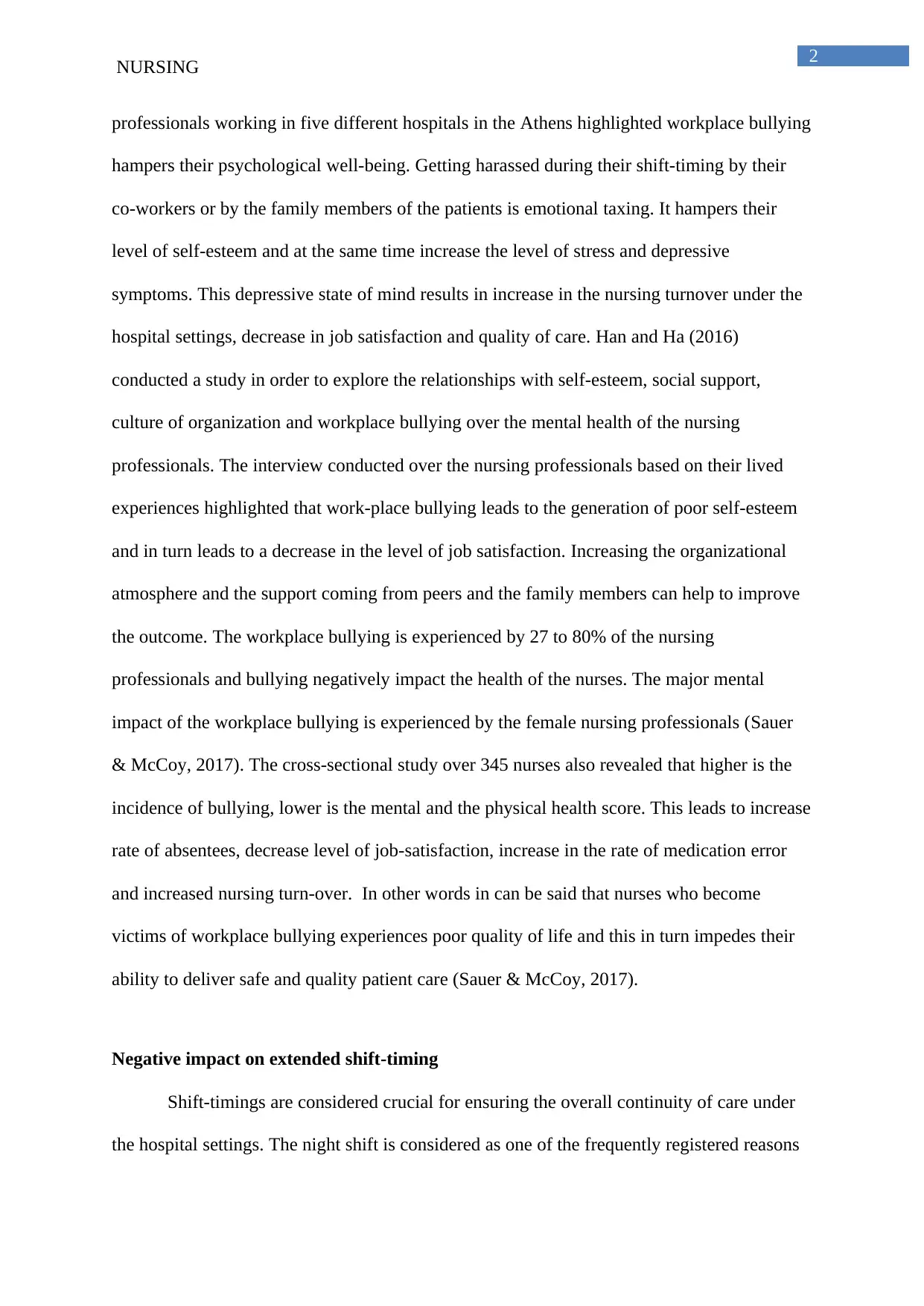
2
NURSING
professionals working in five different hospitals in the Athens highlighted workplace bullying
hampers their psychological well-being. Getting harassed during their shift-timing by their
co-workers or by the family members of the patients is emotional taxing. It hampers their
level of self-esteem and at the same time increase the level of stress and depressive
symptoms. This depressive state of mind results in increase in the nursing turnover under the
hospital settings, decrease in job satisfaction and quality of care. Han and Ha (2016)
conducted a study in order to explore the relationships with self-esteem, social support,
culture of organization and workplace bullying over the mental health of the nursing
professionals. The interview conducted over the nursing professionals based on their lived
experiences highlighted that work-place bullying leads to the generation of poor self-esteem
and in turn leads to a decrease in the level of job satisfaction. Increasing the organizational
atmosphere and the support coming from peers and the family members can help to improve
the outcome. The workplace bullying is experienced by 27 to 80% of the nursing
professionals and bullying negatively impact the health of the nurses. The major mental
impact of the workplace bullying is experienced by the female nursing professionals (Sauer
& McCoy, 2017). The cross-sectional study over 345 nurses also revealed that higher is the
incidence of bullying, lower is the mental and the physical health score. This leads to increase
rate of absentees, decrease level of job-satisfaction, increase in the rate of medication error
and increased nursing turn-over. In other words in can be said that nurses who become
victims of workplace bullying experiences poor quality of life and this in turn impedes their
ability to deliver safe and quality patient care (Sauer & McCoy, 2017).
Negative impact on extended shift-timing
Shift-timings are considered crucial for ensuring the overall continuity of care under
the hospital settings. The night shift is considered as one of the frequently registered reasons
NURSING
professionals working in five different hospitals in the Athens highlighted workplace bullying
hampers their psychological well-being. Getting harassed during their shift-timing by their
co-workers or by the family members of the patients is emotional taxing. It hampers their
level of self-esteem and at the same time increase the level of stress and depressive
symptoms. This depressive state of mind results in increase in the nursing turnover under the
hospital settings, decrease in job satisfaction and quality of care. Han and Ha (2016)
conducted a study in order to explore the relationships with self-esteem, social support,
culture of organization and workplace bullying over the mental health of the nursing
professionals. The interview conducted over the nursing professionals based on their lived
experiences highlighted that work-place bullying leads to the generation of poor self-esteem
and in turn leads to a decrease in the level of job satisfaction. Increasing the organizational
atmosphere and the support coming from peers and the family members can help to improve
the outcome. The workplace bullying is experienced by 27 to 80% of the nursing
professionals and bullying negatively impact the health of the nurses. The major mental
impact of the workplace bullying is experienced by the female nursing professionals (Sauer
& McCoy, 2017). The cross-sectional study over 345 nurses also revealed that higher is the
incidence of bullying, lower is the mental and the physical health score. This leads to increase
rate of absentees, decrease level of job-satisfaction, increase in the rate of medication error
and increased nursing turn-over. In other words in can be said that nurses who become
victims of workplace bullying experiences poor quality of life and this in turn impedes their
ability to deliver safe and quality patient care (Sauer & McCoy, 2017).
Negative impact on extended shift-timing
Shift-timings are considered crucial for ensuring the overall continuity of care under
the hospital settings. The night shift is considered as one of the frequently registered reasons
⊘ This is a preview!⊘
Do you want full access?
Subscribe today to unlock all pages.

Trusted by 1+ million students worldwide
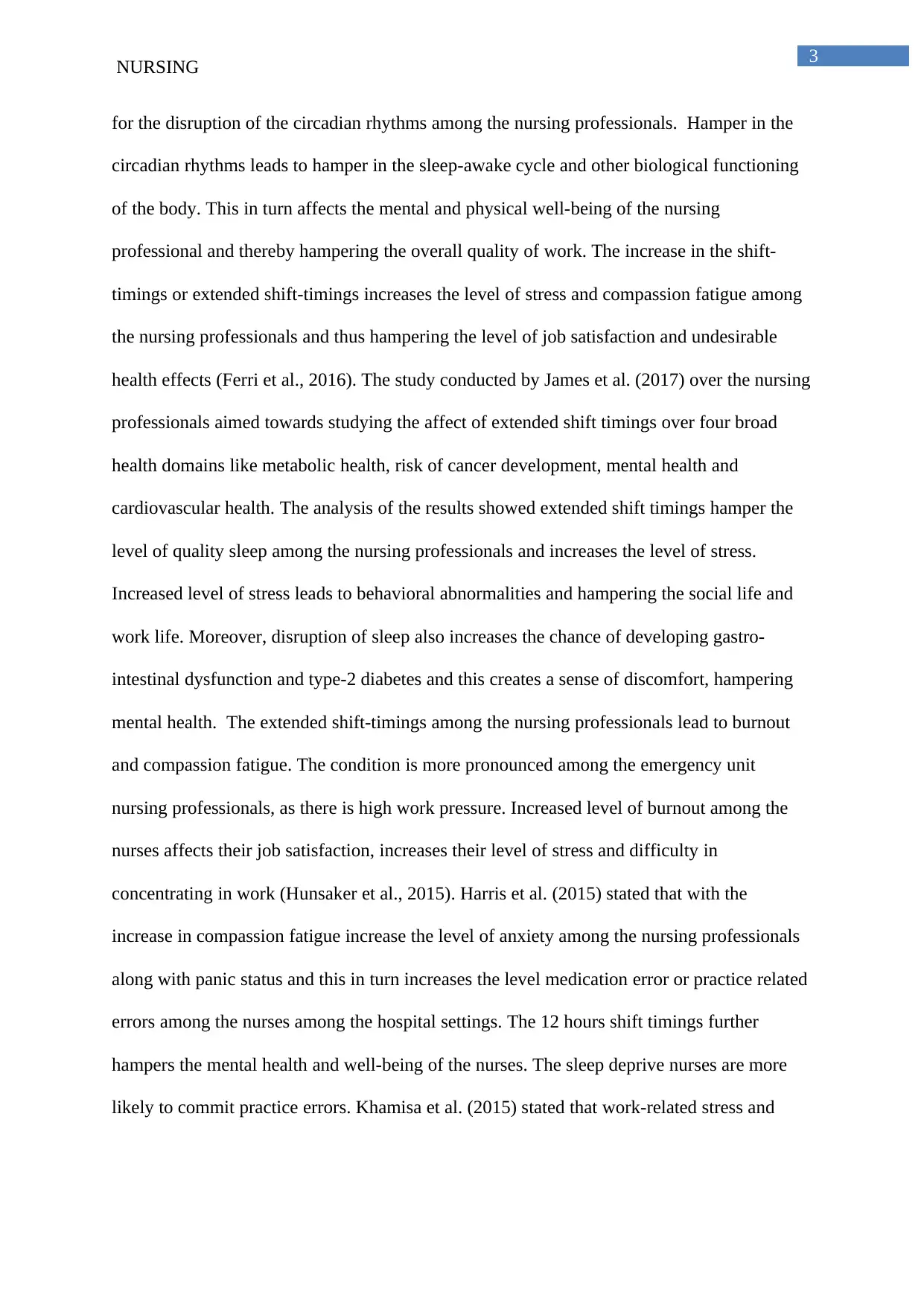
3
NURSING
for the disruption of the circadian rhythms among the nursing professionals. Hamper in the
circadian rhythms leads to hamper in the sleep-awake cycle and other biological functioning
of the body. This in turn affects the mental and physical well-being of the nursing
professional and thereby hampering the overall quality of work. The increase in the shift-
timings or extended shift-timings increases the level of stress and compassion fatigue among
the nursing professionals and thus hampering the level of job satisfaction and undesirable
health effects (Ferri et al., 2016). The study conducted by James et al. (2017) over the nursing
professionals aimed towards studying the affect of extended shift timings over four broad
health domains like metabolic health, risk of cancer development, mental health and
cardiovascular health. The analysis of the results showed extended shift timings hamper the
level of quality sleep among the nursing professionals and increases the level of stress.
Increased level of stress leads to behavioral abnormalities and hampering the social life and
work life. Moreover, disruption of sleep also increases the chance of developing gastro-
intestinal dysfunction and type-2 diabetes and this creates a sense of discomfort, hampering
mental health. The extended shift-timings among the nursing professionals lead to burnout
and compassion fatigue. The condition is more pronounced among the emergency unit
nursing professionals, as there is high work pressure. Increased level of burnout among the
nurses affects their job satisfaction, increases their level of stress and difficulty in
concentrating in work (Hunsaker et al., 2015). Harris et al. (2015) stated that with the
increase in compassion fatigue increase the level of anxiety among the nursing professionals
along with panic status and this in turn increases the level medication error or practice related
errors among the nurses among the hospital settings. The 12 hours shift timings further
hampers the mental health and well-being of the nurses. The sleep deprive nurses are more
likely to commit practice errors. Khamisa et al. (2015) stated that work-related stress and
NURSING
for the disruption of the circadian rhythms among the nursing professionals. Hamper in the
circadian rhythms leads to hamper in the sleep-awake cycle and other biological functioning
of the body. This in turn affects the mental and physical well-being of the nursing
professional and thereby hampering the overall quality of work. The increase in the shift-
timings or extended shift-timings increases the level of stress and compassion fatigue among
the nursing professionals and thus hampering the level of job satisfaction and undesirable
health effects (Ferri et al., 2016). The study conducted by James et al. (2017) over the nursing
professionals aimed towards studying the affect of extended shift timings over four broad
health domains like metabolic health, risk of cancer development, mental health and
cardiovascular health. The analysis of the results showed extended shift timings hamper the
level of quality sleep among the nursing professionals and increases the level of stress.
Increased level of stress leads to behavioral abnormalities and hampering the social life and
work life. Moreover, disruption of sleep also increases the chance of developing gastro-
intestinal dysfunction and type-2 diabetes and this creates a sense of discomfort, hampering
mental health. The extended shift-timings among the nursing professionals lead to burnout
and compassion fatigue. The condition is more pronounced among the emergency unit
nursing professionals, as there is high work pressure. Increased level of burnout among the
nurses affects their job satisfaction, increases their level of stress and difficulty in
concentrating in work (Hunsaker et al., 2015). Harris et al. (2015) stated that with the
increase in compassion fatigue increase the level of anxiety among the nursing professionals
along with panic status and this in turn increases the level medication error or practice related
errors among the nurses among the hospital settings. The 12 hours shift timings further
hampers the mental health and well-being of the nurses. The sleep deprive nurses are more
likely to commit practice errors. Khamisa et al. (2015) stated that work-related stress and
Paraphrase This Document
Need a fresh take? Get an instant paraphrase of this document with our AI Paraphraser
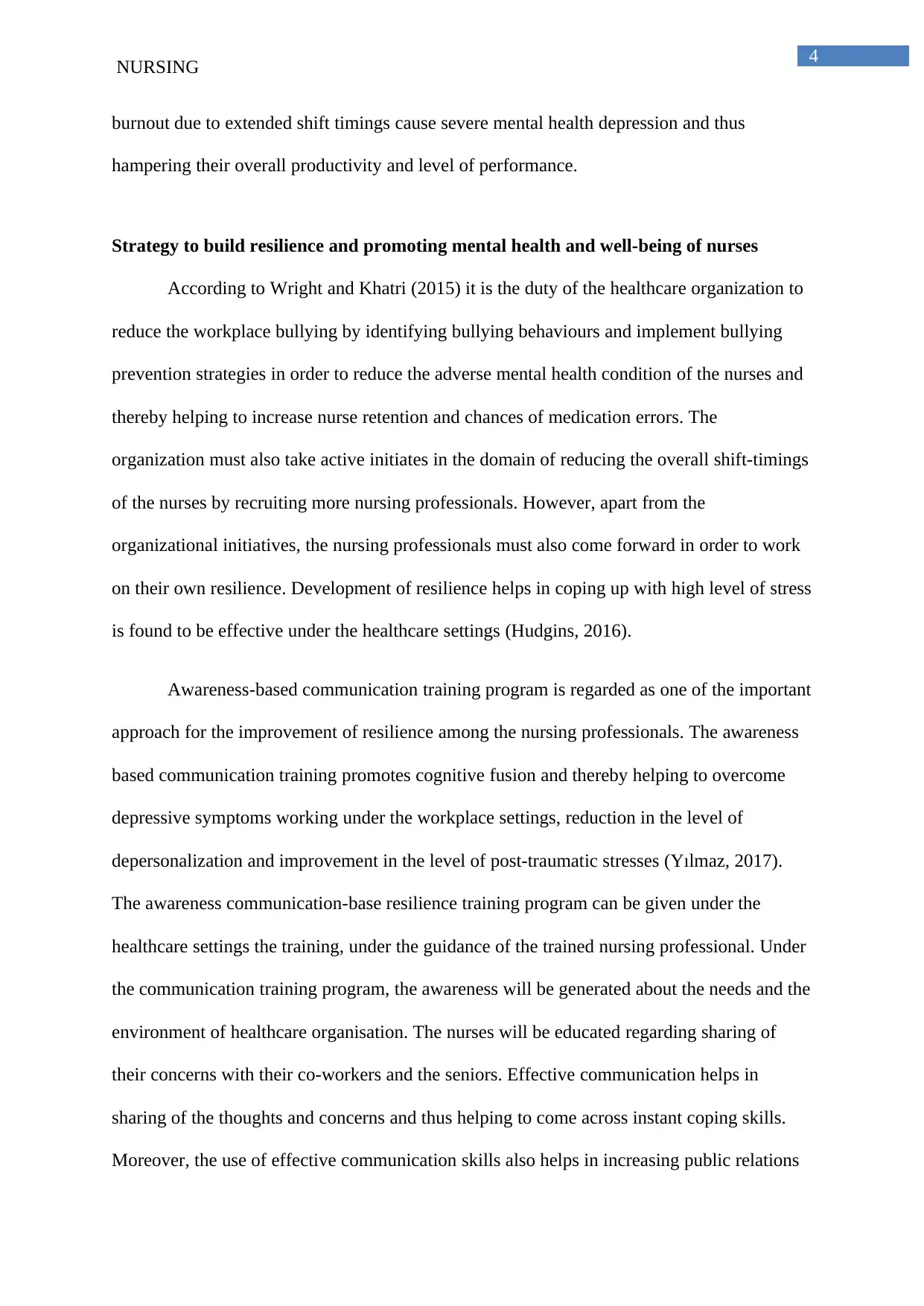
4
NURSING
burnout due to extended shift timings cause severe mental health depression and thus
hampering their overall productivity and level of performance.
Strategy to build resilience and promoting mental health and well-being of nurses
According to Wright and Khatri (2015) it is the duty of the healthcare organization to
reduce the workplace bullying by identifying bullying behaviours and implement bullying
prevention strategies in order to reduce the adverse mental health condition of the nurses and
thereby helping to increase nurse retention and chances of medication errors. The
organization must also take active initiates in the domain of reducing the overall shift-timings
of the nurses by recruiting more nursing professionals. However, apart from the
organizational initiatives, the nursing professionals must also come forward in order to work
on their own resilience. Development of resilience helps in coping up with high level of stress
is found to be effective under the healthcare settings (Hudgins, 2016).
Awareness-based communication training program is regarded as one of the important
approach for the improvement of resilience among the nursing professionals. The awareness
based communication training promotes cognitive fusion and thereby helping to overcome
depressive symptoms working under the workplace settings, reduction in the level of
depersonalization and improvement in the level of post-traumatic stresses (Yılmaz, 2017).
The awareness communication-base resilience training program can be given under the
healthcare settings the training, under the guidance of the trained nursing professional. Under
the communication training program, the awareness will be generated about the needs and the
environment of healthcare organisation. The nurses will be educated regarding sharing of
their concerns with their co-workers and the seniors. Effective communication helps in
sharing of the thoughts and concerns and thus helping to come across instant coping skills.
Moreover, the use of effective communication skills also helps in increasing public relations
NURSING
burnout due to extended shift timings cause severe mental health depression and thus
hampering their overall productivity and level of performance.
Strategy to build resilience and promoting mental health and well-being of nurses
According to Wright and Khatri (2015) it is the duty of the healthcare organization to
reduce the workplace bullying by identifying bullying behaviours and implement bullying
prevention strategies in order to reduce the adverse mental health condition of the nurses and
thereby helping to increase nurse retention and chances of medication errors. The
organization must also take active initiates in the domain of reducing the overall shift-timings
of the nurses by recruiting more nursing professionals. However, apart from the
organizational initiatives, the nursing professionals must also come forward in order to work
on their own resilience. Development of resilience helps in coping up with high level of stress
is found to be effective under the healthcare settings (Hudgins, 2016).
Awareness-based communication training program is regarded as one of the important
approach for the improvement of resilience among the nursing professionals. The awareness
based communication training promotes cognitive fusion and thereby helping to overcome
depressive symptoms working under the workplace settings, reduction in the level of
depersonalization and improvement in the level of post-traumatic stresses (Yılmaz, 2017).
The awareness communication-base resilience training program can be given under the
healthcare settings the training, under the guidance of the trained nursing professional. Under
the communication training program, the awareness will be generated about the needs and the
environment of healthcare organisation. The nurses will be educated regarding sharing of
their concerns with their co-workers and the seniors. Effective communication helps in
sharing of the thoughts and concerns and thus helping to come across instant coping skills.
Moreover, the use of effective communication skills also helps in increasing public relations
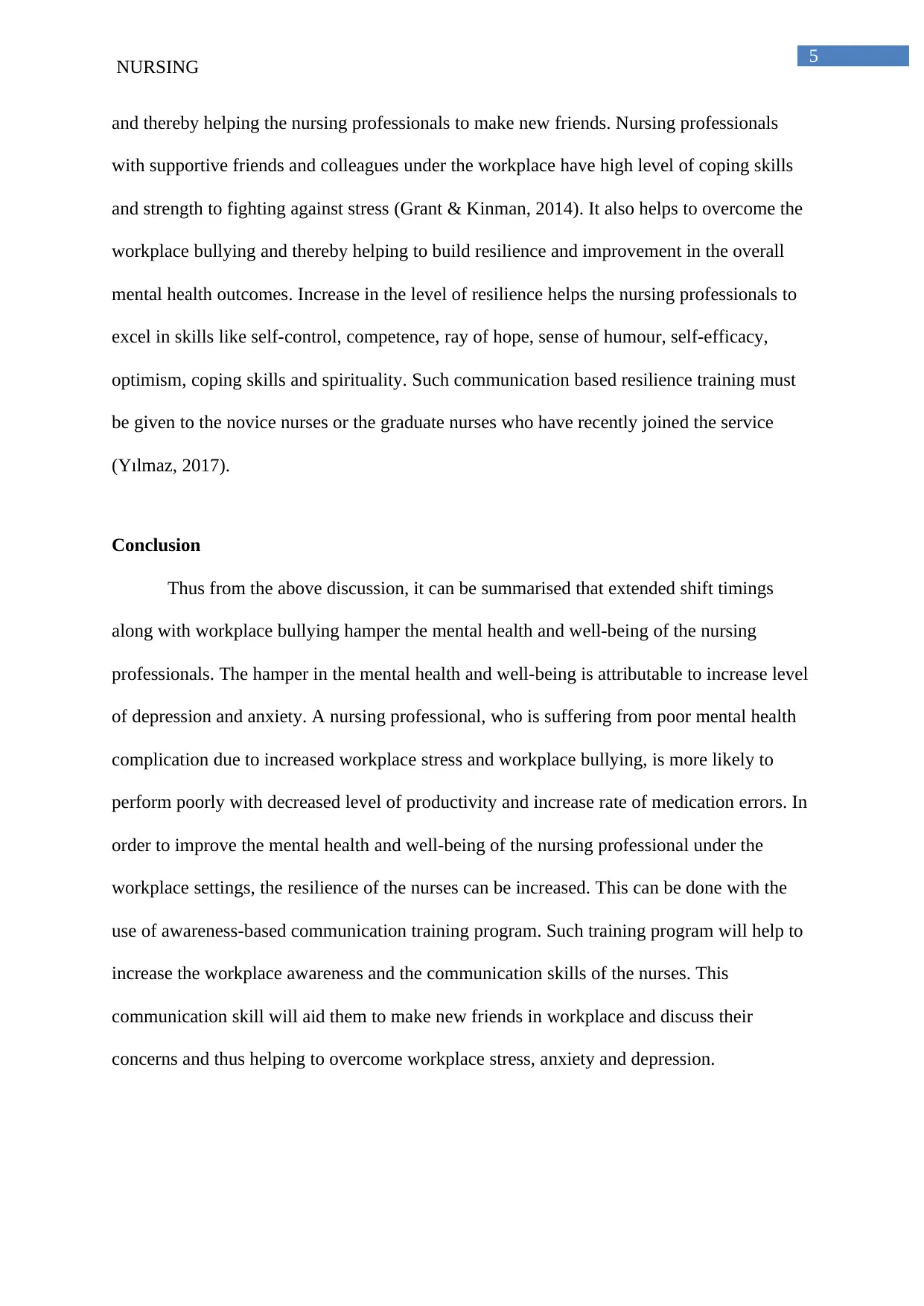
5
NURSING
and thereby helping the nursing professionals to make new friends. Nursing professionals
with supportive friends and colleagues under the workplace have high level of coping skills
and strength to fighting against stress (Grant & Kinman, 2014). It also helps to overcome the
workplace bullying and thereby helping to build resilience and improvement in the overall
mental health outcomes. Increase in the level of resilience helps the nursing professionals to
excel in skills like self-control, competence, ray of hope, sense of humour, self-efficacy,
optimism, coping skills and spirituality. Such communication based resilience training must
be given to the novice nurses or the graduate nurses who have recently joined the service
(Yılmaz, 2017).
Conclusion
Thus from the above discussion, it can be summarised that extended shift timings
along with workplace bullying hamper the mental health and well-being of the nursing
professionals. The hamper in the mental health and well-being is attributable to increase level
of depression and anxiety. A nursing professional, who is suffering from poor mental health
complication due to increased workplace stress and workplace bullying, is more likely to
perform poorly with decreased level of productivity and increase rate of medication errors. In
order to improve the mental health and well-being of the nursing professional under the
workplace settings, the resilience of the nurses can be increased. This can be done with the
use of awareness-based communication training program. Such training program will help to
increase the workplace awareness and the communication skills of the nurses. This
communication skill will aid them to make new friends in workplace and discuss their
concerns and thus helping to overcome workplace stress, anxiety and depression.
NURSING
and thereby helping the nursing professionals to make new friends. Nursing professionals
with supportive friends and colleagues under the workplace have high level of coping skills
and strength to fighting against stress (Grant & Kinman, 2014). It also helps to overcome the
workplace bullying and thereby helping to build resilience and improvement in the overall
mental health outcomes. Increase in the level of resilience helps the nursing professionals to
excel in skills like self-control, competence, ray of hope, sense of humour, self-efficacy,
optimism, coping skills and spirituality. Such communication based resilience training must
be given to the novice nurses or the graduate nurses who have recently joined the service
(Yılmaz, 2017).
Conclusion
Thus from the above discussion, it can be summarised that extended shift timings
along with workplace bullying hamper the mental health and well-being of the nursing
professionals. The hamper in the mental health and well-being is attributable to increase level
of depression and anxiety. A nursing professional, who is suffering from poor mental health
complication due to increased workplace stress and workplace bullying, is more likely to
perform poorly with decreased level of productivity and increase rate of medication errors. In
order to improve the mental health and well-being of the nursing professional under the
workplace settings, the resilience of the nurses can be increased. This can be done with the
use of awareness-based communication training program. Such training program will help to
increase the workplace awareness and the communication skills of the nurses. This
communication skill will aid them to make new friends in workplace and discuss their
concerns and thus helping to overcome workplace stress, anxiety and depression.
⊘ This is a preview!⊘
Do you want full access?
Subscribe today to unlock all pages.

Trusted by 1+ million students worldwide
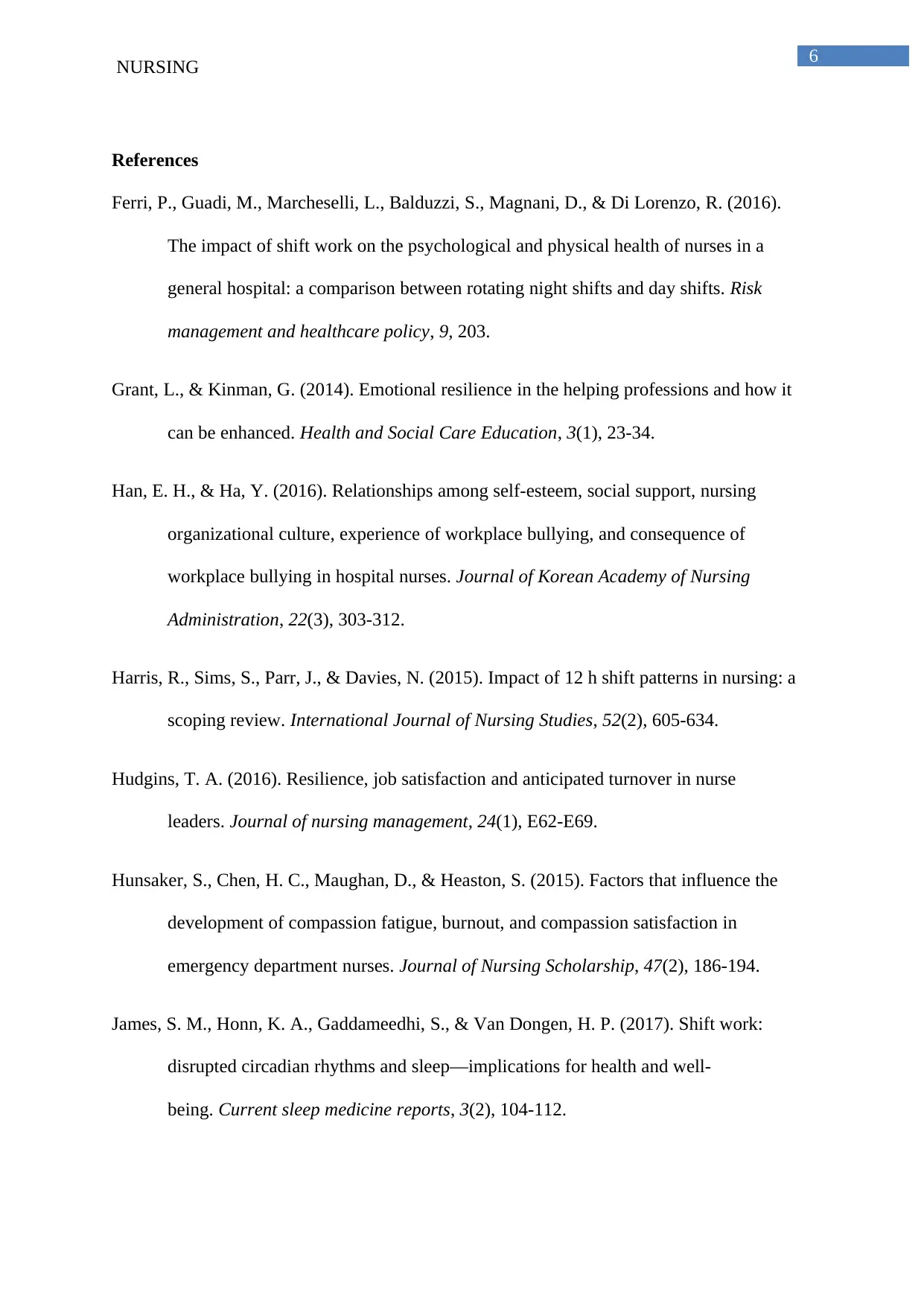
6
NURSING
References
Ferri, P., Guadi, M., Marcheselli, L., Balduzzi, S., Magnani, D., & Di Lorenzo, R. (2016).
The impact of shift work on the psychological and physical health of nurses in a
general hospital: a comparison between rotating night shifts and day shifts. Risk
management and healthcare policy, 9, 203.
Grant, L., & Kinman, G. (2014). Emotional resilience in the helping professions and how it
can be enhanced. Health and Social Care Education, 3(1), 23-34.
Han, E. H., & Ha, Y. (2016). Relationships among self-esteem, social support, nursing
organizational culture, experience of workplace bullying, and consequence of
workplace bullying in hospital nurses. Journal of Korean Academy of Nursing
Administration, 22(3), 303-312.
Harris, R., Sims, S., Parr, J., & Davies, N. (2015). Impact of 12 h shift patterns in nursing: a
scoping review. International Journal of Nursing Studies, 52(2), 605-634.
Hudgins, T. A. (2016). Resilience, job satisfaction and anticipated turnover in nurse
leaders. Journal of nursing management, 24(1), E62-E69.
Hunsaker, S., Chen, H. C., Maughan, D., & Heaston, S. (2015). Factors that influence the
development of compassion fatigue, burnout, and compassion satisfaction in
emergency department nurses. Journal of Nursing Scholarship, 47(2), 186-194.
James, S. M., Honn, K. A., Gaddameedhi, S., & Van Dongen, H. P. (2017). Shift work:
disrupted circadian rhythms and sleep—implications for health and well-
being. Current sleep medicine reports, 3(2), 104-112.
NURSING
References
Ferri, P., Guadi, M., Marcheselli, L., Balduzzi, S., Magnani, D., & Di Lorenzo, R. (2016).
The impact of shift work on the psychological and physical health of nurses in a
general hospital: a comparison between rotating night shifts and day shifts. Risk
management and healthcare policy, 9, 203.
Grant, L., & Kinman, G. (2014). Emotional resilience in the helping professions and how it
can be enhanced. Health and Social Care Education, 3(1), 23-34.
Han, E. H., & Ha, Y. (2016). Relationships among self-esteem, social support, nursing
organizational culture, experience of workplace bullying, and consequence of
workplace bullying in hospital nurses. Journal of Korean Academy of Nursing
Administration, 22(3), 303-312.
Harris, R., Sims, S., Parr, J., & Davies, N. (2015). Impact of 12 h shift patterns in nursing: a
scoping review. International Journal of Nursing Studies, 52(2), 605-634.
Hudgins, T. A. (2016). Resilience, job satisfaction and anticipated turnover in nurse
leaders. Journal of nursing management, 24(1), E62-E69.
Hunsaker, S., Chen, H. C., Maughan, D., & Heaston, S. (2015). Factors that influence the
development of compassion fatigue, burnout, and compassion satisfaction in
emergency department nurses. Journal of Nursing Scholarship, 47(2), 186-194.
James, S. M., Honn, K. A., Gaddameedhi, S., & Van Dongen, H. P. (2017). Shift work:
disrupted circadian rhythms and sleep—implications for health and well-
being. Current sleep medicine reports, 3(2), 104-112.
Paraphrase This Document
Need a fresh take? Get an instant paraphrase of this document with our AI Paraphraser
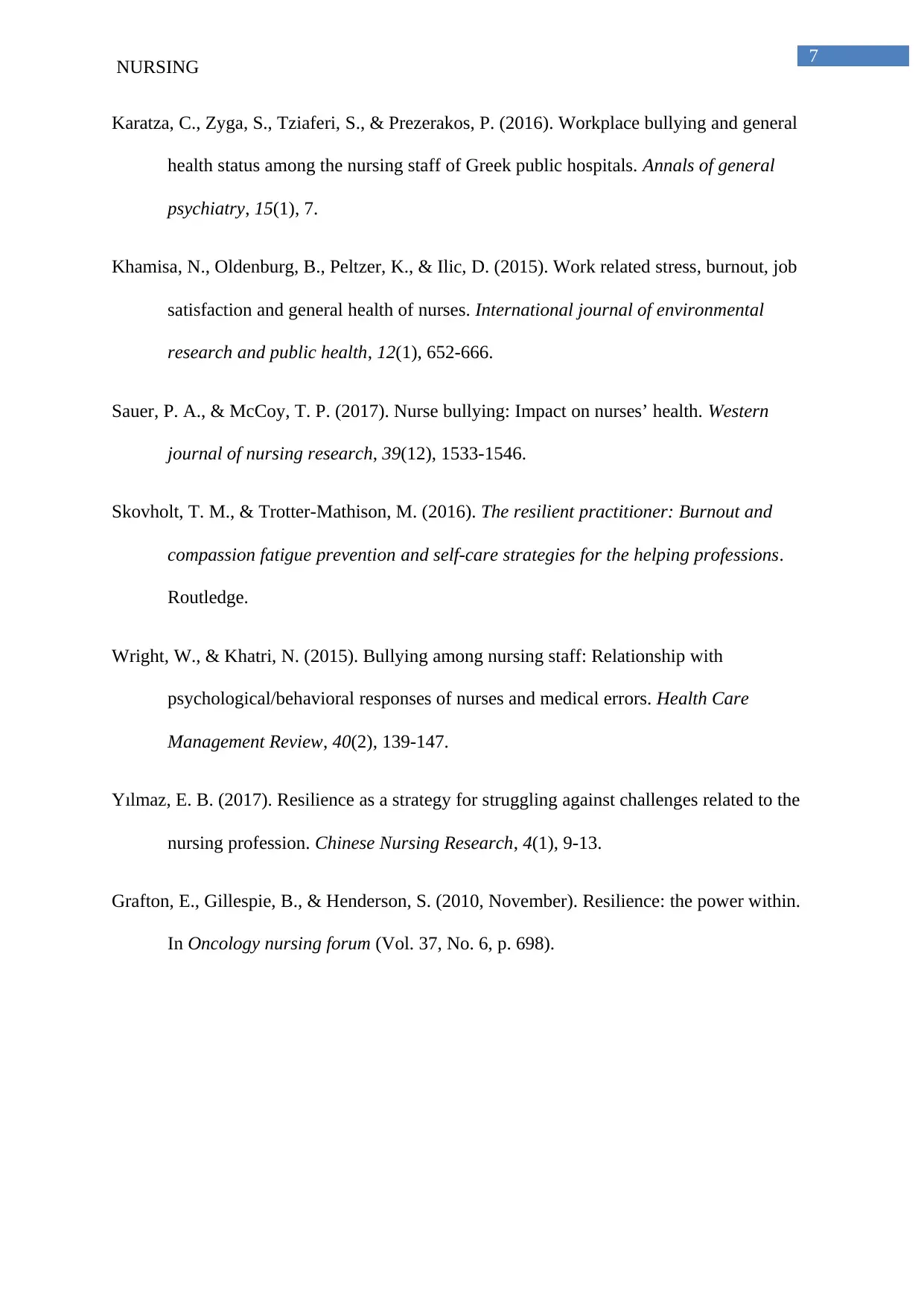
7
NURSING
Karatza, C., Zyga, S., Tziaferi, S., & Prezerakos, P. (2016). Workplace bullying and general
health status among the nursing staff of Greek public hospitals. Annals of general
psychiatry, 15(1), 7.
Khamisa, N., Oldenburg, B., Peltzer, K., & Ilic, D. (2015). Work related stress, burnout, job
satisfaction and general health of nurses. International journal of environmental
research and public health, 12(1), 652-666.
Sauer, P. A., & McCoy, T. P. (2017). Nurse bullying: Impact on nurses’ health. Western
journal of nursing research, 39(12), 1533-1546.
Skovholt, T. M., & Trotter-Mathison, M. (2016). The resilient practitioner: Burnout and
compassion fatigue prevention and self-care strategies for the helping professions.
Routledge.
Wright, W., & Khatri, N. (2015). Bullying among nursing staff: Relationship with
psychological/behavioral responses of nurses and medical errors. Health Care
Management Review, 40(2), 139-147.
Yılmaz, E. B. (2017). Resilience as a strategy for struggling against challenges related to the
nursing profession. Chinese Nursing Research, 4(1), 9-13.
Grafton, E., Gillespie, B., & Henderson, S. (2010, November). Resilience: the power within.
In Oncology nursing forum (Vol. 37, No. 6, p. 698).
NURSING
Karatza, C., Zyga, S., Tziaferi, S., & Prezerakos, P. (2016). Workplace bullying and general
health status among the nursing staff of Greek public hospitals. Annals of general
psychiatry, 15(1), 7.
Khamisa, N., Oldenburg, B., Peltzer, K., & Ilic, D. (2015). Work related stress, burnout, job
satisfaction and general health of nurses. International journal of environmental
research and public health, 12(1), 652-666.
Sauer, P. A., & McCoy, T. P. (2017). Nurse bullying: Impact on nurses’ health. Western
journal of nursing research, 39(12), 1533-1546.
Skovholt, T. M., & Trotter-Mathison, M. (2016). The resilient practitioner: Burnout and
compassion fatigue prevention and self-care strategies for the helping professions.
Routledge.
Wright, W., & Khatri, N. (2015). Bullying among nursing staff: Relationship with
psychological/behavioral responses of nurses and medical errors. Health Care
Management Review, 40(2), 139-147.
Yılmaz, E. B. (2017). Resilience as a strategy for struggling against challenges related to the
nursing profession. Chinese Nursing Research, 4(1), 9-13.
Grafton, E., Gillespie, B., & Henderson, S. (2010, November). Resilience: the power within.
In Oncology nursing forum (Vol. 37, No. 6, p. 698).
1 out of 8
Related Documents
Your All-in-One AI-Powered Toolkit for Academic Success.
+13062052269
info@desklib.com
Available 24*7 on WhatsApp / Email
![[object Object]](/_next/static/media/star-bottom.7253800d.svg)
Unlock your academic potential
Copyright © 2020–2026 A2Z Services. All Rights Reserved. Developed and managed by ZUCOL.





